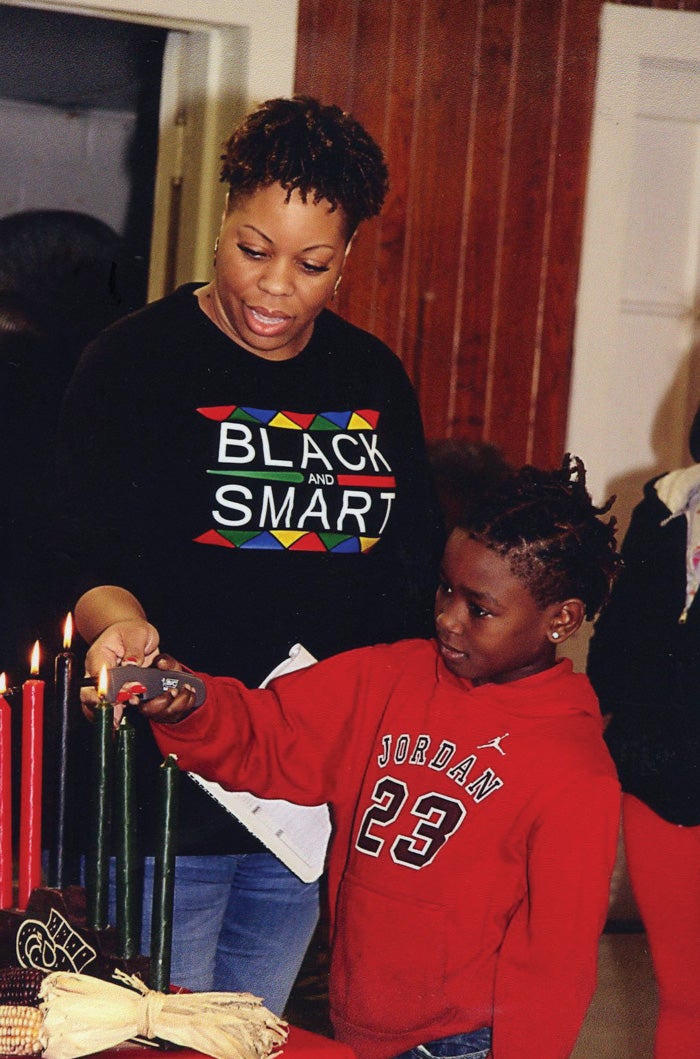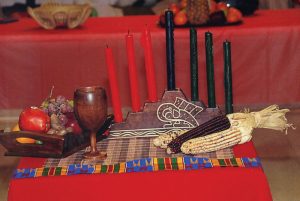Post 107 celebrates Kwanzaa
Published 12:00 am Sunday, January 13, 2019

- Kenya Bennett is assisted by Kamden Krider. Submitted photo.

Traditional Kwanzaa symbols. Submitted photo.
Submitted
J. C. Price Post 107 and its auxiliary hosted a celebration of Kwanzaa and Holiday lights on Dec. 29, 2018 at the Post home. Excitement flowed through the auditorium as children and their parents gathered for the festive occasion.
Kwanzaa is a unique American holiday that pays tribute to the rich cultural roots of Americans of African ancestry. Kwanzaa means “the first” or “the first fruits of the harvest” in the East African language of Kiswahili.
Traditionally, Kwanzaa is observed Dec. 26-Jan. 1. The seven day celebration is profound and meaningful. The Seven Principles of Kwanzaa serve as guides for daily living. The Principle for Day One is Omoja (Unity), Day Two, Kujichagulis ( Self-determination), Day Three, Ujima (Collective Work and Responsibility), Day Four, Ujamaa (Cooperative Economics), Day Five, Nia (Purpose), Day Six, Kuumba (Creativity), and Day Seven, Imani (Faith). These principles are defined and emphasized as necessary elements for productive living and to honor, love and respect self and others. Every aspect of the week-long celebration is designed to remind us to remember our ancestors, their sacrifices, and their will to overcome hardships; to cherish our family; to honor our elders; and to know our worth and value. It is a calling to never forget the history of our people, to reassess ourselves as individuals, and to recommit to making a difference in our personal life as well as to others. Kwanzaa always ends with a celebration of rejoicing.
Like other holidays, Kwanzaa has its symbols. The seven basic symbols are instructive and inspirational objects that represent and reinforce desirable principles, concepts, and practices and reflect traditional concepts which evolved out of the life and struggle of African-American people: Mazao (fruit and vegetables), Mkeka (place mat), Kinara (the candle holder for seven candles-one black, three red, and three green), Vibunzi (ears of corn reflective of the number of children in the home), Zawadi (gifts), Kikombe Cha Umoja (communal unity cup), and Mishumaa Saba (the seven candles).
The week-long celebration was condensed into a one day affair with Kenya Bennett as facilitator. The elders were recognized and honored. The room was decorated with hand-carved sculptures made in Ghana, African-American art work, Kenta cloth and other items that signified the occasion.
As each of The Seven Principles was presented, Bennett gave the meaning. She asked the children to recite the words behind her and they gave their own meaning and input. She drafted seven children to assist in lighting a candle that represented each Principle.
Auxiliary members prepared a Kwanzaa feast (Karamu) of yams, green beans, corn, and baked chicken for all to enjoy. Chamoni Hairston and Teanna Krider were the recipients of the two bicycles that were given away as door prizes. Each child received a bag of fruit that included candy and nuts as well as a gift bag and a handmade Kwanzaa bracelet assembled for them by auxiliary members.
For the finale, children and parents loaded onto a motor coach and traveled to the Charlotte Motor Speedway to see the holiday lights.
Auxiliary member Renita H. Craig served as coordinator of the event. A. J. Alexander is auxiliary president.



